Welcome to my nightmare.
No, not being tethered to a penguin by a rope only a few feet long—that actually sounds like a dream come true. Penguins have been my favorite animal since I studied them in the first grade. I even played the part of a lost penguin looking for his mother in that year’s school play. My line was, “‘Ack,’ my mother says ‘ack.’” Penguin parents and their babies have unique calls (ick, uck, eek, ack, etc.), and the play was about a group of babies who’d been separated from their parents. Luckily, by the end of the show, my mother had found me, and my problem was solved, putting an end to a truly harrowing 15-minute search.
Unfortunately, there was no such happy ending during my playthrough of Bread & Fred, and therein lies the nightmare. You see, this is my first review of a game that was provided by the publisher (flex?), and I was beyond thrilled to dive in. I had sampled the game briefly at PAX East 2024, but failed to make much progress, which I chalked up to being a total beginner and learning on the fly using an unfamiliar demo setup. It turns out, though, Bread & Fred is just hard. Like, hard. And not just difficult, but particularly punishing as well. It quickly answered a question I’ve often wondered: What do professional game reviewers do when they can’t actually beat a game?
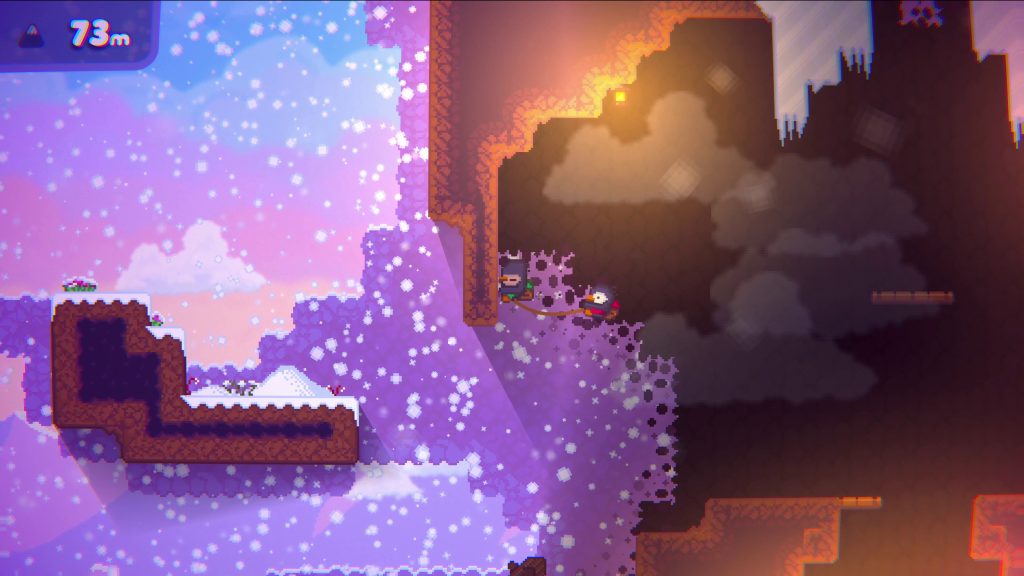
Believe me, I already hesitated to call myself a “professional” game reviewer before Bread & Fred, but now I definitely won’t be putting that on my business card any time soon. I feel practically obligated to lay out my gaming credentials just so I don’t sound like a total scrub when I talk about how Bread & Fred completely kicked my butt. If you’re curious: I’ve speedrun Super Mario Bros. 3 in 15 minutes. I completed 2023’s The Legend of Zelda: Tears of the Kingdom while holding a baby (mine, specifically). I almost beat Banjo Kazooie when I was a kid, but then my dad accidentally deleted my save file when I was about to get to the final boss and I never made it back after all these years and I’ve only forgiven him after years of therapy. He’s probably going to read this, actually; might need to talk some things out with him…
But I digress. Speaking of needing therapy, Bread & Fred. Let’s get into it.
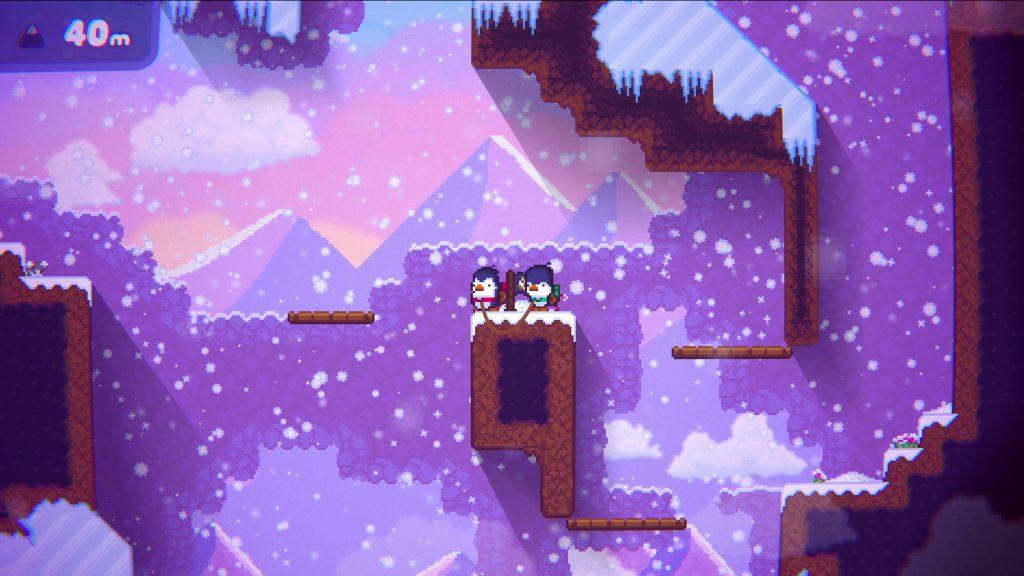
My Name Is Jeff
In case I haven’t painted enough of a picture: Bread & Fred is a platformer where two players are tasked with the lofty goal of ascending a mountain as one of the two titular pixel-art penguins. The trick here is that you and your partner are tied together by a sturdy rope that never changes length.
This mechanic puts a heavy emphasis on player-to-player communication, as you attempt to navigate Bread & Fred’s painfully unforgiving landscape. The game is meant to be played in co-op mode, either locally or online, which is what initially drew me to it and remains one of my favorite things about it. There aren’t enough modern multiplayer games where co-op isn’t an add-on or afterthought. After giving Bread & Fred a shot at PAX with a friend, I thought it a perfect couch game to tackle with him or my wife.
Unfortunately, I think they lasted a combined 20 minutes before they each threw their hands up and gave up trying to be the Fred to my Bread. We could barely get past the first jump in co-op mode, as it requires careful coordination and extremely precise timing. I’m not talking about the first level or the first boss; I’m talking about the first jump in the tutorial. One player must plant themselves on a floating platform while the other builds up momentum swinging in a full circle around said platform. At the perfect moment, the grounded partner must release and jump so they match the arc of the swinging partner and carry both players through the air to the next platform.
I’m not sure how many tries it took us to get past this part, but it’s safe to say too many. There were more laughs about our futility than there was any yelling or screaming, but we were plenty frustrated by our lack of success, and it wasn’t long before I found myself, much like Jason Derulo, ridin’ solo.
As grateful as I was for the co-op mode, I was just as happy to see that the game supports a full single-player campaign. It was a bit of a shame to know that I wouldn’t be seeing everything Bread & Fred had to offer with a friend by my side, but for the sake of completing literally any part of the game, it was for the best. In solo mode, you play as a third penguin, Greg. Instead of being tied to another penguin, you’re attached to a rock with a drawn-on face, affectionately referred to as Jeff. While “Greg & Jeff” doesn’t quite roll off the tongue, it was only because of them that I got to finally embark on my quest to the mountaintop.
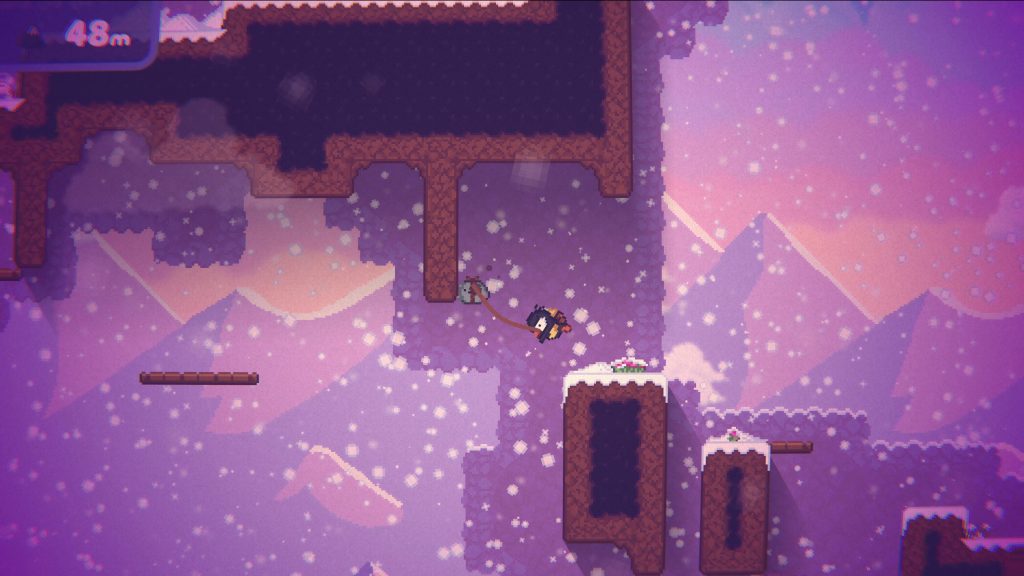
Misty Mountain Hop
Mercifully, the single-player experience is slightly less chaotic than the co-op version of Bread & Fred. Once I got the hang of the new controls, I slowly but steadily found myself enjoying the climb.
The main mechanic here is the ability to lift and toss Jeff, the rock, across gaps and over obstacles. Greg can then hoist himself up by the rope they’re connected with, or swing and jump to the next landing spot. Greg can also hold on to certain walls for a limited time, while Jeff can embed into those same areas when thrown with enough speed. There’s plenty of platforming fun to be had as you make progress and start to see your on-screen altitude meter grow higher and higher with each successful jump.
While I wouldn’t say anything here is particularly groundbreaking for a platforming game, the first couple of zones, The Friendly Foothills and The Fishy Mines, do a great job of providing variety and challenge while not feeling unfair. Each successive jump and maneuver is carefully thought out and pieced together with clear intention. There is very little room for error when traversing the map, but that’s as much a testament to the game’s difficulty as it is to the high level of detail and care put into creating such a tight package.
Speaking of the overall package, the game’s presentation is absolutely terrific. From the initial title screen to the game options, everything here screams quality. The music is top-notch, and I was struck by the small but detailed sound effects heard when bouncing around the different menus, including a slide whistle that brought me right back to my Banjo Kazooie days. There are tons of achievements to collect, as well as a nicely illustrated in-game manual with tips and tricks to help you along your journey. While I did encounter a bug or two (one failed jump resulted in me bouncing off the ground and flying 100m back up in the air), there’s no denying the amount of polish in Bread & Fred.
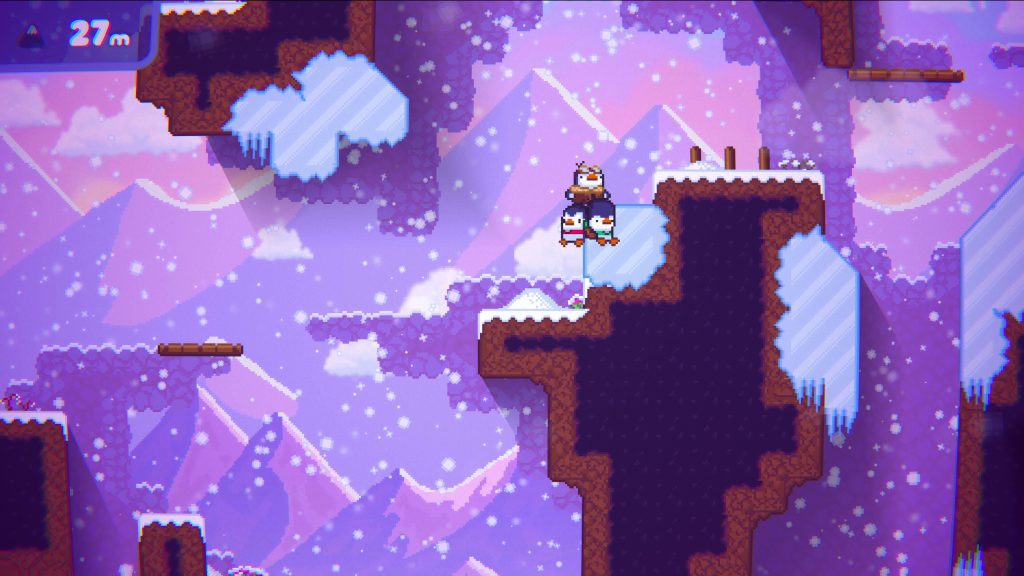
It’s Dangerous To Go Alone
Among the more impactful design choices in Bread & Fred are the “Assist Options” waiting for you in the game’s menu. These include the ability to create checkpoints anywhere on the map that you can fast travel back to, as well as a setting that lets you perform quite literal game-breaking “Infinite Jumps.” (The latter option is described with a lovingly sarcastic caption: “You can also just jump infinitely, who cares anymore.”)
I have to mention these for two main reasons. First and foremost, I love that they are included in a game that is as tough as this. That level of detail and commitment to accessibility is a fantastic selling point when it comes to getting your game in the hands of the most people possible. And it’s a good thing too, because reason number two is that for my money, this game would not be possible without them.
I waited this far to get into Bread & Fred’s pitfalls in part because I really did enjoy my time with the game. Despite the near impossibility of completing it, I never lost my composure or became as frustrated with it as I probably should have. That’s mostly due to the assist options, which allowed me to bypass any part of the game I found to be above my skill level. Unfortunately, that ended up being the entire second half.
Around the midway point, Bread & Fred introduces a tried-and-true gimmick sure to delight and tickle any gamer who has been around the block a few times: wind. Every few seconds, a stiff breeze makes its way through the mountain, knocking Greg and Jeff around if they aren’t careful enough to hunker down. This twist has been done before (it’s a big reason why I hated the end of Celeste), and in my opinion, this is where the game goes from unforgiving to broken. The trouble with the wind mechanic isn’t that it adds a layer of complexity or demands more focus from the player; it’s that it slows the game down to a crawl. There’s no way to “get past” it, so instead of having the freedom to navigate obstacles at your own pace, you’re forced to wait for gaps in the gale to make your move.
Consider also the structure of the game—that every jump or fall contributes to your overall altitude—and the balance of risk and reward all but goes out the window. The added weather pattern means any wrongly timed action could cause you to be pushed down to a cliff dozens of meters below you. At one point, a fall brought me back down over 100 meters, or 20% of the game, which surely would have resulted in a controller through the television had I not been able to set a checkpoint from where I took off. Without the ability to warp back up to my previous location, Bread & Fred would be both grueling and utterly back-breaking. Luckily, it’s only a pain if you allow it to be one—and I wasn’t about to.
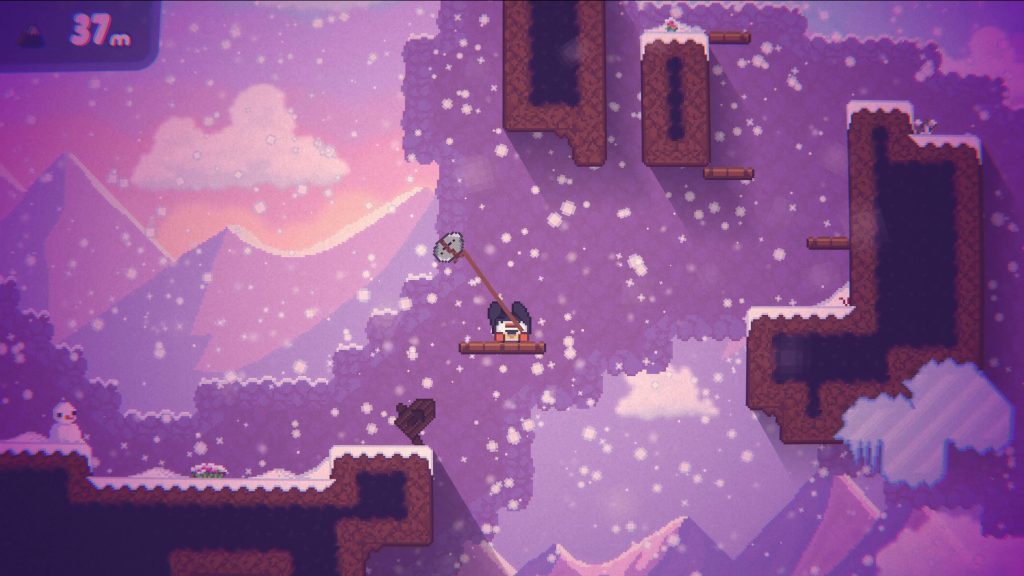
I Believe I Can Fly
Once I realized I wasn’t going to make it any further the old-fashioned way, I decided to explore what “infinite jumps” could do. It turns out they’re exactly as advertised, essentially gifting our penguin pals a trait they’ve always longed for: the ability to fly.
I spent the back half of the game giving a real shot to whatever jumps seemed reasonable, while easily soaring over any that proved too much for me to handle. There’s little to no story in single-player mode, so there isn’t much reason to explore, but I wanted to be sure I wasn’t skipping over anything important on my fast track to the end. Based on some achievements that I didn’t end up… achieving, it does appear there is more to do in the main co-op mode, but due to the utter lack of progress my partners and I were able to make, I’m not sure I’ll ever get to experience those side quests.
In the end, bypassing half the game by Flappy Bird-ing my way to the finish line wasn’t exactly how I expected my playthrough to go, but I was glad to see that despite my ineptitude, I too could reach the end credits with a little hard work and determination (or cheating).
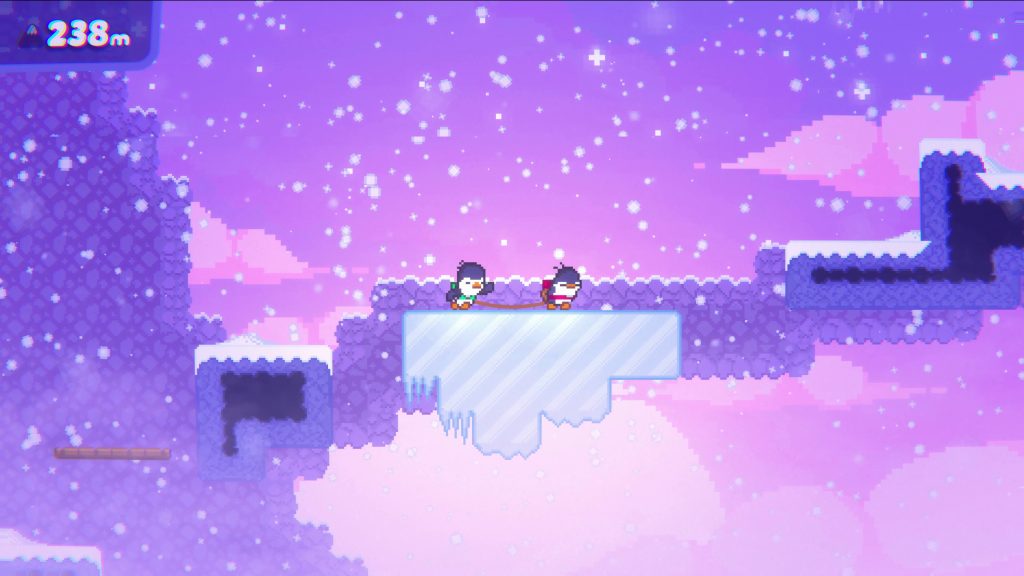
Final Thoughts
Clearly, my initial expectation that Bread & Fred was an adorable and accessible puzzle platformer fit for the whole family proved to be off base. While it isn’t the game’s fault that I had something else in mind when I booted it up, it remains extremely difficult to rate due to its actual intended purpose: to cause you pain. I have to commend the game for its overall strong presentation, including music, visuals, and, of course, its assist options. Outside of the rough difficulty, I can only really knock Bread & Fred for a few bugs and glitches, but none of them were game-breaking.
Ultimately, if you’re looking for a casual, easygoing experience with some friends, this isn’t a game I’d recommend. But if you’re up for a legitimate challenge and aren’t worried about potentially losing your mind or loved ones, I can’t give it anything less than a sterling score. Assuming you’re like me and lie somewhere in the middle, I’ve got to split the difference.
Regardless of your penchant for difficulty, good luck. You’re going to need it.
Score: 7.5/10
Bread & Fred, developed by SandCastles Studio and published by Apogee Entertainment, is available now on PC, Mac, and Nintendo Switch. It retails for $14.99.
Disclaimer: A review code was provided by the publisher.
Zack has been hooked on games ever since his older brother taught him where to find the secret warp whistles in Mario Bros. 3. He has never felt more joy than when Yoshi congratulated him on getting 120 stars in Mario 64 or more sadness than when he played Kingdom Hearts 3 after waiting 14 years for it. Zack mails a letter to Nintendo every day asking them to bring back Chibi Robo and will gladly tell you all about why it’s one of the greatest games of all time. He was hoping that writing for the site would help him get through his backlog, but it actually just made it worse now that he’s hearing about so many more great hidden gems. Oops…


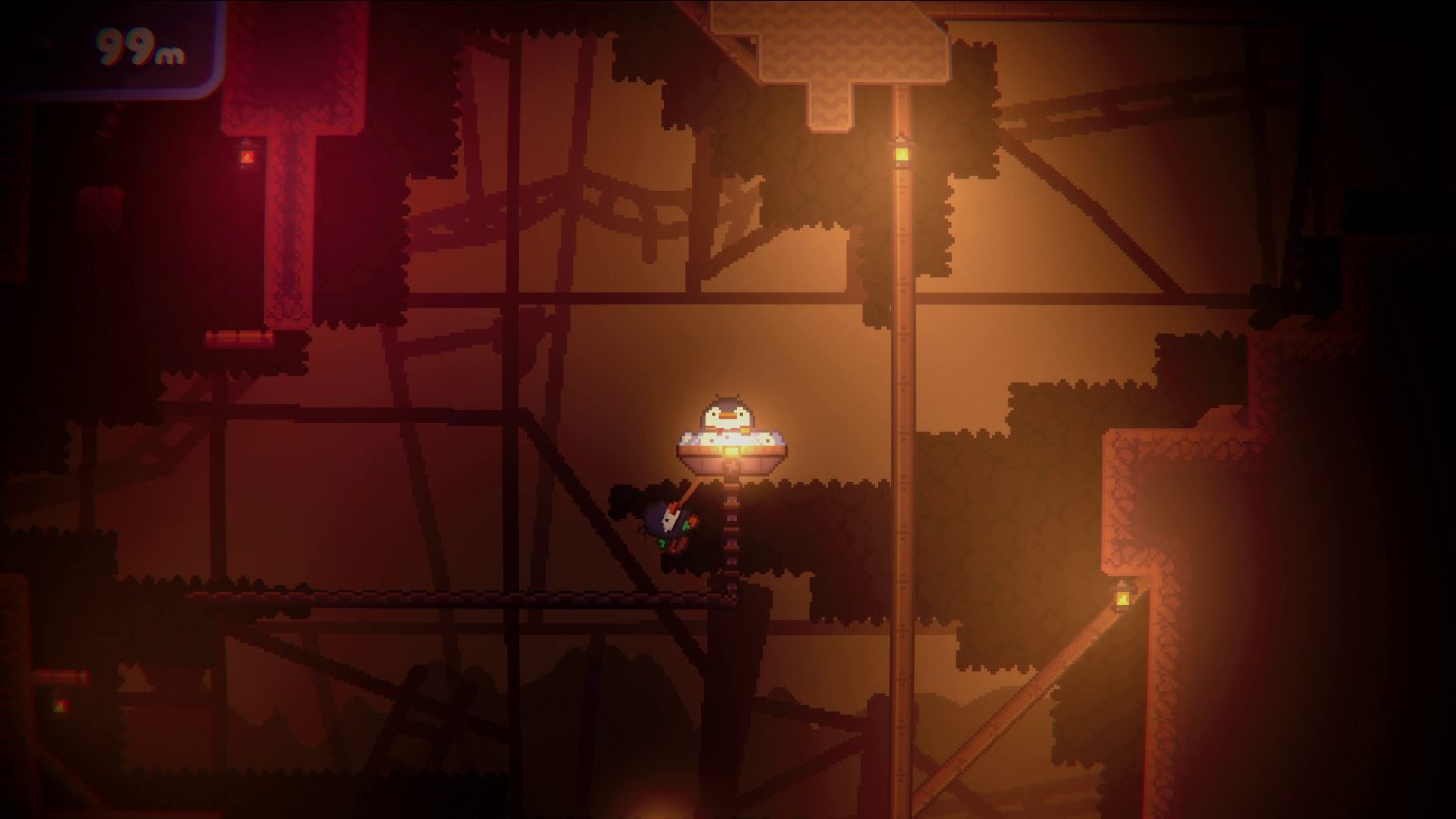








2 Comments
Dad here. We’ll talk.
LOL